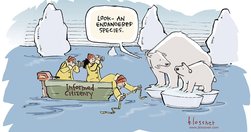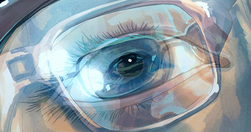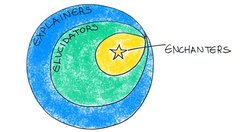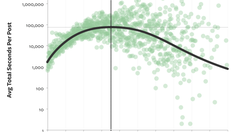Relevant Overviews
- Communication Strategy
- Content Strategy
- Online Strategy
- Online Community Management
- Social Media Strategy
- Content Creation & Marketing
- Digital Transformation
- Change & Project Management
- Innovation Strategy
- Communications Tactics
- Psychology
- Social Web
- Media
- Politics
- Communications Strategy
- Science&Technology
- Business

We went to Antarctica to understand how changes to its vast ice sheet might affect the world.

Each side of the climate debate accuses the other of exaggeration and suffers from its own... sometimes feel like a shouting match in a roomful of children wearing earplugs... We have allowed our political, national, economic, and cultural narratives free play ... where... are the narratives from science itself? Where is the science teacher?... p…
Popular Science, wants to avoid the temptation of directly fighting against science skepticism... populism not as something to react against, but something we can work with... the more “scientifically curious” (as opposed to just knowledgeable) people are, the less likely they are to hold polarized beliefs ... more likely to be open to new inform…
scientists and their supporters need to paint a positive vision of the future, where science re-affirms its moral authority, articulates how it will help us, and advances a noble cause

Scientists often speak of the “general public” as a group that is far removed from the academic circles that they belong to.... Scientists have “othered” the general public... there is no such thing ... except for in very specific contexts (i.e. vaccine developers are not the general public vs those who do not develop vaccines when one is speaking…

A common intuition is that the main goal of science communication is to present facts; once people encounter those facts, they will think and behave accordingly....in reality, just knowing facts doesn’t necessarily guarantee that one’s opinions and behaviors will be consistent with them... Convincing people that scientific evidence has merit and …

Freedom of speech, and of the press... also brings responsibility. The Editors’ Code of Practice... requires the “highest professional standards”... IPSO’s overall message is that ocean acidification is just a matter of opinion – not a hard-won, testable understanding ... Why support any research if 250 peer-reviewed papers ... can all be summaril…

the science on how to best communicate science across different issues, social settings and audiences has not led to easy-to-follow, concrete recommendations... becoming increasingly clear that the “deficit model” ... if we just “fill people up” with science knowledge and understanding, they’ll become increasingly rational decision-makers – simpl…

The brain ... is an “inference generating organ.” ... predictive coding, according to which perceptions are driven by your own brain and corrected by input from the world... When “the sensory information ... does not match your prediction... you either change your prediction—or you change the sensory information that you receive.” We form our bel…

the increasingly collaborative nature of modern science. Perhaps nothing captures this dichotomy better than the story of the Higgs discovery... Almost 3,000 people qualify as authors on the key physics papers ATLAS produces... easier to guard against bias in interpreting the data The depth and breadth of this effort transform the act of discov…

This principle of science writing... teaches the writer to lead the reader, step by step, from knowing nothing about a subject to understanding enough to grow enchanted with its broader significance.... Imagine science writing as an upside-down pyramid. Start at the bottom with the one fact a reader must know before he can learn any more. The sec…

hierarchy of good writing, particularly of good science writing... Explainers make information clear and comprehensible... Elucidators go beyond explanation and into illumination — they transmute information into understanding by ... integrating various bits of knowledge into a larger framework of comprehension... Enchanters do all of the above, b…
Each issue is conceived around a single topic ... with a new cluster of pieces, grouped together as chapters, published each Thursday.... To supplement ... Facts So Romantic, a blog updated closer to daily Another against-the-grain move: Its print magazine collects the best of the magazine’s web content... printed on high-quality paper and desi…

When it comes to a wide variety of issues ... many of us have opinions that are based on fear or ideology, rather than on what the science says... we even vote (or ask our representatives to vote) on not just policy but on the science ... voting on science is completely antithetical to the entire enterprise ... debate in science isn’t about achiev…

It's not just science reporters who need to evaluate research and learn to tell good studies from bad... perhaps the biggest challenge facing today’s science journalists: Evaluating and interpreting complex and sometimes contradictory results at a time when so many news stories... rely on a fairly sophisticated understanding of science. That make…

Science journalists may write about science, but it’s also our job to look beyond wonders, hypotheses and data. It is to look at the people doing the science and whether they have conflicts of interest, or trace where their money is coming from. It is to look at power structures, to see who is included in the work and who is excluded or marginaliz…

Some people might be satisfied just to let each theory be used for what it is good for and to worry no further. But people like that do not become theoretical physicists. - The most beautiful theory | The Economist

Not only are lobbyists often blamed for the rot in our political process, so too are the corporations who hire those lobbyists. And the media is often eager to simplistically separate the good (those who don’t hire lobbyists) from the bad (those who do)... Environmental Working Group and the Center for Food Safety ... raised more than $42 milli…

"Newsrooms are under pressure. Revenues are down, budgets are being cut, and journalists are losing their jobs. Sadly, it’s often the specialists whose jobs get axed ... Yet, never more than today has the need for sound science journalism been so great." - Why the World Needs Better Science Journalism | MediaShift

In this week’s newsletter I return to the “3 Topics, 12+ links” template of week 1, but present things a little differently…
"Just imagine how much happier you would be if a prematurely deceased loved one were alive, or a debilitated one were vigorous — and multiply that good by several billion, in perpetuity. Given this potential bonanza, the primary moral goal for today’s bioethics can be summarized in a single sentence.Get out of the way. A truly ethical bioethics…
Whatever your position, this is worth a read, and worth using in any discussion of science communications: do you 'keep it short and simple', or 'going long and into depth'? "The more you learn about herbicide resistance, the more you come to understand how complicated the truth about GMOs is. First you discover that they aren’t evil. Then you …

"@NASA is the 104th most popular Twitter account in the world... and 3.5 million on Instagram. The Department of the Interior, whose stunning wildlife and nature pictures make it the only government agency with cool visual content to rival NASA’s, has just 654,000 ... John Yembrick and Jason Townsend are veterans of other government agencies...…

"One of the most frustrating things about reading (or listening to) science journalism is trying to resolve contradictory claims. Coffee is good for you; no, it’s bad for you... Eating meat is good for you; no, don’t eat meat! Some people, like many of those who oppose vaccines, ease the tension by deciding that science is all relative—just a ma…

Good reading for anyone communicating on an issue like science - or indeed the EU: "The problem is that he delivered his argument by targeting the most admirable hallmark of the scientific method: uncertainty in the face of incomplete evidence. And that makes his essay a pernicious attack on science itself. Bilton’s argument follows a familiar f…

"Hughes will be establishing a health and science desk that will consist of approximately five reporters, according to an email from BuzzFeed. A science staff of that size will catapult BuzzFeed News into the top tier of science news sites by sheer size alone. It won't have the largest staff of science reporters, but it will be among the largest. …
"Since it launched in March 2012, I F*cking Love Science has attracted more than 17.9 million Facebook followers—more than Popular Science (2.7 million), Discover (2.7 million), Scientific American (1.9 million), and The New York Times (8 million) combined. ... Her empire has since expanded to include a website, IFLscience.com, which has a staff a…

"those that know how to tell the stories of their work are heard (and subsequently funded) while those who are poor at storytelling are often forgotten and neglected" - Quantum Computing And The Value Of Storytelling In Science - ReadWrite - Station Q, Microsoft: http://www.microsoft.com/en-us/news/stories/stationq/index.html

An alternative to Popular Science's approach: "Climate change articles trigger some of the most heated discussions on Ars Technica... a scientific matter with political ramifications, it's also the focus of astroturfers (fake grassroots movements), trolls, and the willfully scientifically illiterate. At Ars, we take trolling very seriously... we…
Relevant Overviews
- Communication Strategy
- Content Strategy
- Online Strategy
- Online Community Management
- Social Media Strategy
- Content Creation & Marketing
- Digital Transformation
- Change & Project Management
- Innovation Strategy
- Communications Tactics
- Psychology
- Social Web
- Media
- Politics
- Communications Strategy
- Science&Technology
- Business
